
Types of Casters
Casters play a crucial role in the functionality of kitchen equipment, providing the ability to move heavy items with ease. From rigid to swivel, and from plate to stem, each type of caster serves a specific purpose based on your needs. Understanding the differences between these types will help you make an informed decision that best suits your application. Let's explore the different types of casters and their unique features to help you choose the right option for your equipment.
Shop All Casters
What Are Casters?
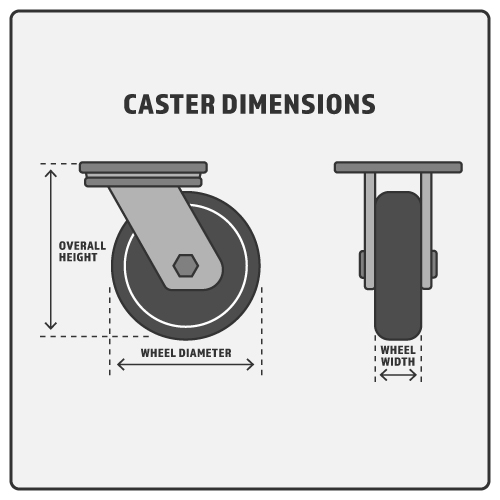
A caster is made up of two parts: a wheel and a mounting bracket. Casters are mounted to carts, racks, trucks, dollies, and heavy equipment to make them movable.
Caster Dimensions
The greater the wheel diameter and width are, the greater the load capacity becomes. This makes it easier to roll your equipment and also reduces the noise level produced by the wheels. Here are the three measurements to check for to ensure you purchase properly sized casters.
Overall height: The distance from the bottom of the wheel to the top of the top plate or caster stem.
Wheel diameter: The distance between the opposite sides of the wheel. Casters are typically labeled by their wheel diameter.
Wheel width: Also known as the tread width, this represents the width of the outer surface of the wheel.
Different Types of Casters
Choosing the right casters for your commercial equipment is key to ensuring smooth mobility and functionality. Here are the main types of casters commonly used in commercial settings:
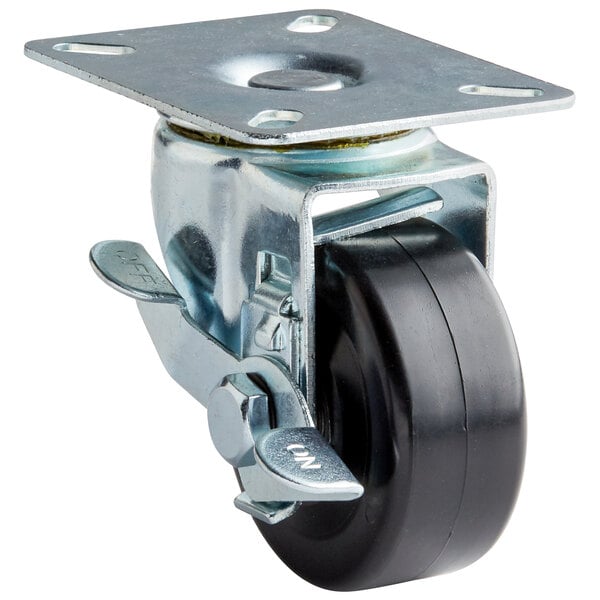
Plate Mount Casters
Plate mount casters are a common choice for many commercial applications. They feature a flat plate that can be easily attached to the bottom of equipment or furniture. Plate mount casters provide stability and support, making them ideal for heavier loads.
- Features a large surface area for stability and mobility
- Ideal choice for heavy-duty equipment
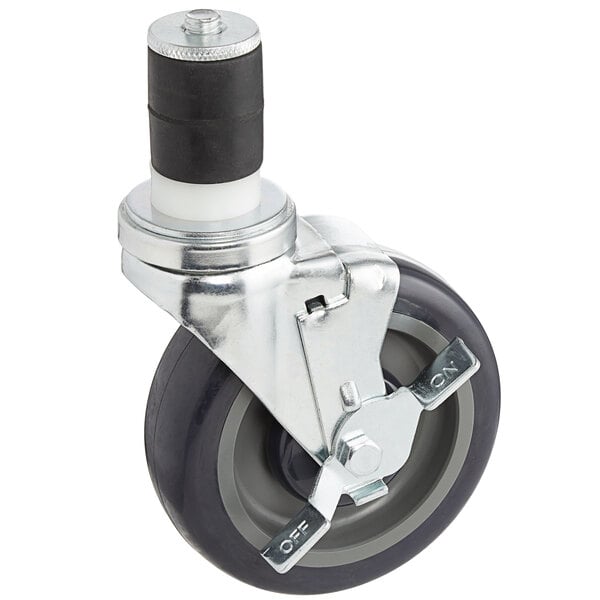
Stem Mount Casters
Stem mount casters have a stem that can be inserted into a socket or hole in the equipment. This type of caster offers a secure attachment and is often used for lighter-duty applications. Stem mount casters are easy to install and provide good maneuverability.
- Easy to replace, clean, and lubricate as needed
- Ideal for lighter-duty applications like small equipment and furniture
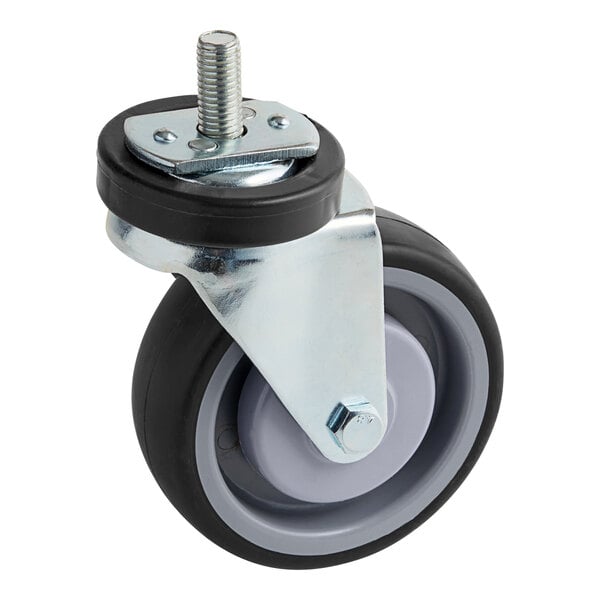
Rigid Casters
Rigid casters are designed to only move in a straight line, offering stability and support. These casters are ideal for applications where equipment needs to move in a fixed direction. Rigid casters are commonly used on carts, dollies, and other equipment that require precise movement.
- Ideal for moving materials in straight lines
- Easier to control and no steering required
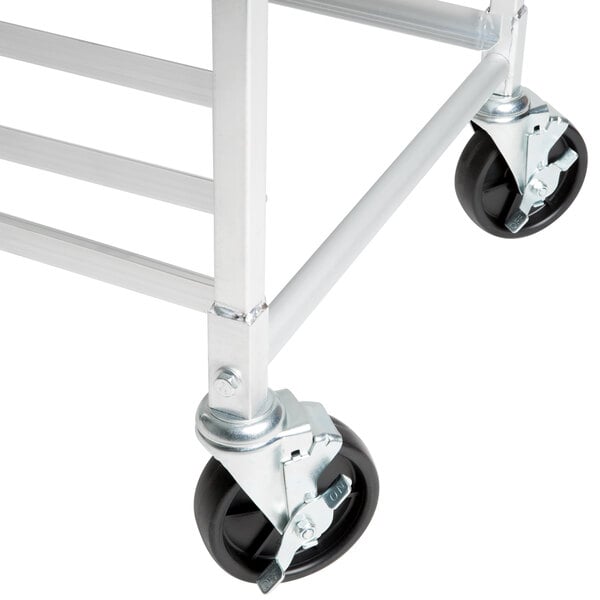
Swivel Casters
Swivel casters feature a swivel mechanism that allows the caster to rotate 360 degrees, providing excellent maneuverability. These casters are ideal for equipment that needs to change direction frequently. Swivel casters are commonly used on carts, chairs, and other mobile equipment.
- Able to swivel 360 degrees so they can move in any direction
- Best suited for turning tight corners and in small spaces
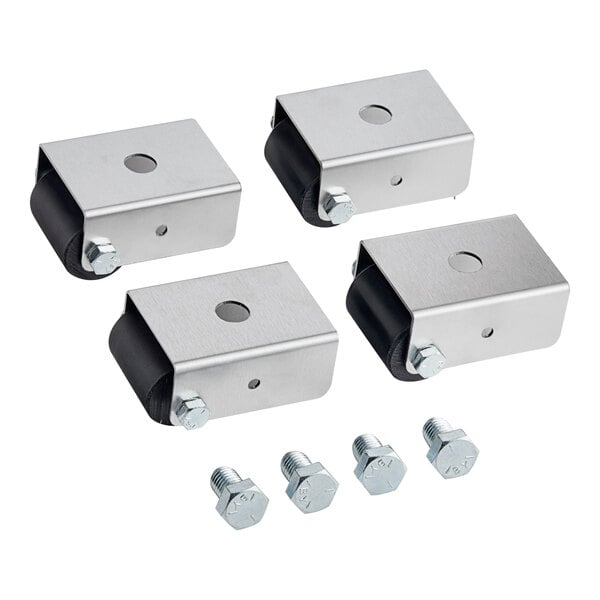
Roller Casters
Roller casters are designed with small rollers instead of wheels, allowing for smooth movement on various surfaces. These casters are ideal for moving equipment out of the way to easily clean the floor beneath. Roller casters are commonly used on prep tables, serving carts, and display racks.
- Gives equipment a low profile
- Enables easy moving for cleaning
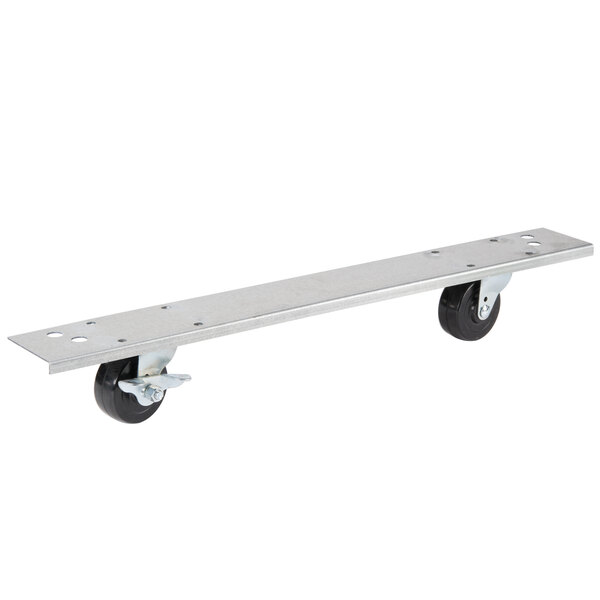
Caster Bases
Caster bases are designed with a mounting assembly that provides a secure attachment point for casters. They come in various designs to ensure proper installation and support for your equipment or furniture. These casters are commonly used in heavy equipment where durability and stability are crucial.
- Enforced for extra stability
- Perfect for heavy equipment
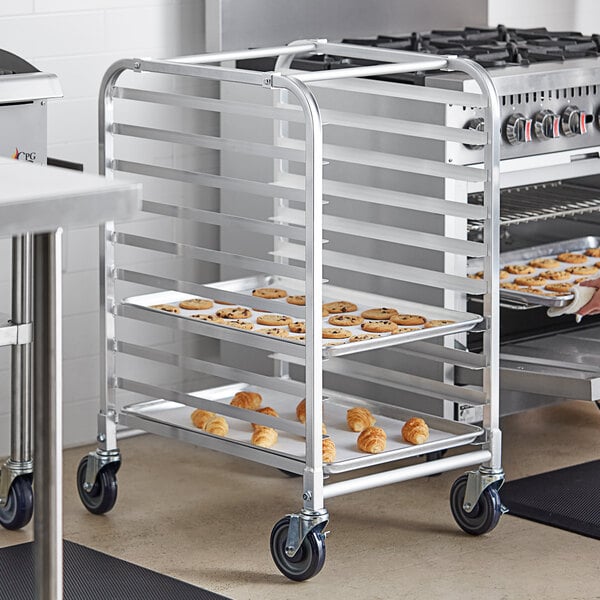
Caster Features
Before making your final caster selection, there are a few caster features you can choose from to create the best user experience in your business:
- Non-Braking Casters: Non-braking casters are designed to provide smooth and continuous movement without sudden stops or jerks. These casters are ideal for applications where a constant and uninterrupted flow is required, such as in food service environments.
- Casters with Brakes: Casters with brakes offer added stability and security by allowing users to lock the wheels in place when needed. This feature is especially beneficial for equipment that needs to remain stationary during use or when loading and unloading items.
- Adjustable Casters: Adjustable casters provide flexibility in terms of height and leveling, allowing users to customize the equipment's mobility to suit their specific needs. This feature is particularly useful in environments where uneven surfaces or varying heights are common.
- NSF-Listed Casters: NSF-listed casters meet stringent standards set by the National Sanitation Foundation (NSF) for food safety and sanitation. These casters are recommended for use in commercial kitchens, food processing facilities, and other food-related applications to ensure compliance with industry regulations.
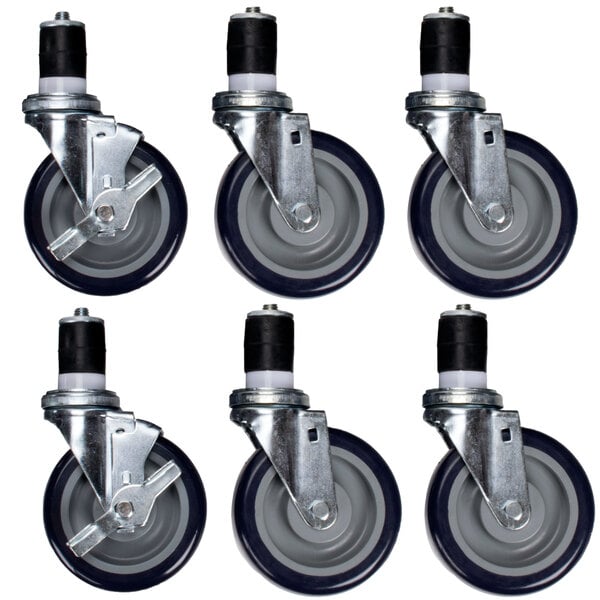
Types of Caster Wheel Materials
The wheel material is an important decision when choosing your caster since different materials are best suited for different environments and temperatures.
- Fiberglass wheels are ideal for heavy-duty, high-temperature environments.
- Neoprene rubber wheels are highly resistant to grease, fats, and oils. They have a sufficient level of cushioning to protect floors and roll quietly, making them ideal for softer floor types.
- Nylon wheels are ideal for heavy-duty, high-temperature, and corrosive environments. Suitable for both hard and soft floor surfaces, nylon wheels are great for concrete floors because of their durability and impact resistance.
- Phenolic resin wheels are highly resistant to oil, grease, gasoline, and mild acids. They are ideal for use on smooth concrete floors and are not recommended for wet applications or rough surfaces.
- Polyolefin wheels resist hard impacts and are non-marking. They are suited for use in wet and corrosive applications.
- Polypropylene wheels provide easy rolling and chemical resistance. They work well in wet and oily environments.
- Polyurethane wheels have some cushioning to protect floors and roll easily while handling a greater load capacity. Suitable for both hard, soft, and uneven floor surfaces, they are abrasion-resistant as well as resistant to grease and oils.
- Solid rubber wheels are long-lasting because they do not have air inside, so you do not have to worry about flats. They provide good floor protection and a quiet operation, making them a great choice for softer floor types.
Caster Purchasing Considerations
If you are purchasing casters as an add-on accessory to your piece of equipment, here are some factors you will need to consider.
What floor type will the wheels be going over? Softer floor types, such as hardwood, will require softer wheel materials while harder floor types, such as concrete, can handle harder wheel materials.
What is the work environment like? If your workspace is wet and/or oily, or if exposure to chemicals is a concern, it is important to choose wheel materials that will be able to handle these conditions.
What is the level of maneuverability you need? If you only need to go up and down a hallway, rigid casters are most likely all you need. However, if you need to maneuver a cart or piece of equipment in a tight space, a swivel caster is likely the better option for you.
What is the load capacity that the casters will need to support? The larger the load capacity is, typically the harder wheel material and larger wheel diameter you will need.
Is noise level a concern? Typically, the greater the wheel size is, the quieter the casters will be. Some caster materials have more shock- and vibration-resistance for lower noise levels, which may be a concern in retail or healthcare environments.
Do the casters need to have brakes? If you need to secure the unit after moving it, then you should look into purchasing braking or locking casters. Often only having two out of the four casters with brakes is sufficient for your unit.
Do you need NSF-rated casters? Ideal for foodservice areas and food manufacturing facilities, NSF-rated casters are built to stay sanitary in environments where the casters will be frequently exposed to washdowns, oils, or chemicals.

Prior to purchasing casters for your unit, it is important to check if your unit can support casters as an add-on accessory, and if so, what casters are compatible with the unit. Check the manufacturer's literature and reference the You May Also Need or Replacement Parts and Accessories section on the product's page to find your unit's compatible casters.
Related Resources

September 2024 WebstaurantStore Coupon Code
Fall is here, and to celebrate Webstaurantstore is offering a selection of amazing deals! In September, you'll discover incredible prices on classic fall flavors, glassware, cold cups, and much more! Take a look at our selection of sale items below and don't forget to enter the code COZY24 at checkout to enjoy savings of up to 25%! We're also excited to introduce the new Webstaurant Rewards® Visa Business Card ! Sign up for a new card today and start earning rewards on every WebstaurantStore purchase. Discover the latest discounts on consumable food and beverage items with September's monthly coupon code. From ready-to-bake pastries to classic fall flavoring mixes, you can find great deals on essential consumables for your commercial kitche
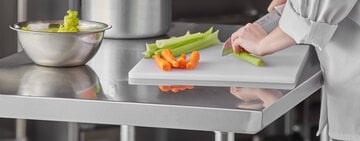
Commercial Kitchen Work Table Guide
While outfitting your commercial kitchen, finding the right work table is essential. Stainless steel work tables have long been considered the industry standard due to their durability, versatility, and ease of cleaning. They come in various forms, each designed to cater to different kitchen needs. Whether you need a compact prep table for a small kitchen or a spacious workbench for heavy-duty food preparation, educating yourself on the various stainless steel work tables helps you make informed purchasing decisions that align with your kitchen's unique requirements. Shop All Commercial Work Tables and Stations Click any of the tips below to skip to the work table information that most interests you: Stainless Steel Gauges Work Table Backsp
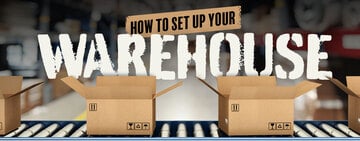
How to Set Up a Warehouse
If you've outgrown your current space, starting your own warehouse could be the next logical step in storing and selling your company's products online . Or it could be a profitable new venture to create a warehouse and rent out your space to other businesses. No matter what your business goals are, setting up a warehouse from scratch requires some careful planning. The layout and allocation of your space need to be mapped out early on. We've created this warehouse layout guide to help you set up any type of warehouse for maximum efficiency. Shop All Industrial Supplies Click below to learn more about basic warehouse design: Inbound Loading Dock Receiving Storage and Putaway Picking Shipping Outbound Loading Dock Other Warehouse Spaces Comm
- Topics 1410
- Industrial 55
- Troubleshooting Guides 23
- Restaurant Management 130
- Bar Management 59
- Catering Tips 38
- Bakery Management 43
- Food Trucks & Concessions 50
- Advertising & Marketing 37
- Eco-Friendly Tips 11
- Facility Layout & Design 44
- Coffee Shop Tips 30
- Installation & Maintenance 56
- Janitorial & Pest Control 30
- Safety & Sanitation 95
- Startup Tips 104
- Menu Design 10
- Kitchen & Cooking Tips 85
- Hospitality Management 24
- Pizza & Sandwich Shop Tips 37
- Smallwares 37
- Food Prep 98
- Tabletop Items 18
- Disposables 23
- Calculators & Tools 6
- Consumables 53
- Warewashing & Laundry 19
- Cooking Equipment 99
- Food Storage & Refrigeration 52
- Beverage Equipment 38
- Office Supplies 6


